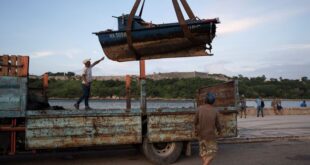(Reuters) – Gabon’s President Ali Bongo, 64, who officers said on Wednesday was under house arrest after a coup, followed a well-trodden path in the region: born to a ruling dynasty, he promised a new start before facing accusations of graft and rigged elections.
Bongo’s campaign to preserve oil-producing Gabon’s rainforests and forest elephants, a cornerstone of his rule since coming to power in 2009, initially raised hopes he might bring change in a region of autocrats.
That image lost its sheen when opponents accused him of rigging the 2016 vote and brutally quelling protests afterwards. Following a stroke, his fitness to rule was questioned, sparking a failed coup in 2019 as he convalesced in Morocco.
Where that coup failed, the latest military intervention may end one of post-colonial Africa’s longest-running political dynasties that began when his father Omar took power in 1967.
Groomed for the presidency during Omar’s 42-year rule, ‘Bongo Junior’ came to power after a contentious vote in 2009, vowing to modernise a country hooked on dwindling oil reserves and famed for its ultra-rich, champagne-guzzling elite.
A fan of jazz and the music of Michael Jackson, French-educated Bongo’s fluent English and his global outlook raised expectations in a population desperate for Gabon’s oil and mineral wealth to be shared more fairly.
But new industries did not grow quickly and deep inequality has persisted, with almost a third of Gabon’s 2.3 million people living below the poverty line. Libreville’s Atlantic beach hotels lie less than a mile from families living in hillside shanties.
Bongo was born Alain Bernard Bongo in neighbouring Congo Republic in 1959. He attended a private school and university in France, developing a love for American music.
In 1978 he released “A Brand New Man”, a nine-track solo funk album with a cover showing Bongo in a wide-collared white shirt open across his chest and gold rings on clenched fists.
“Thought that it was cool, breaking all the rules,” he croons in the song “I wanna stay with you”.
‘CONSPICUOUS WEALTH’
But he then returned to Gabon to hold senior roles under his father, including defence and foreign minister.
After Omar’s death in 2009, Ali won the presidency in an election, but his victory sparked clashes between police and supporters of aggrieved rivals who said the poll was fraudulent.
Keen to distance himself from his father, who relied on business deals with former colonial power France and who became a symbol of oil-fuelled extravagance, Bongo promised to diversify the economy and protect the environment.
He slashed the number of ministers in government and capped salaries for officials running state businesses.
U.S. diplomats still said he had “the family predilection for fancy cars and other emblems of conspicuous wealth”, but they also praised his reforms as a departure from the past, according to cables in 2009 and 2010 released by WikiLeaks.
He strived to give the impression of a common touch in public. Before sitting down for a televised interview with Reuters after his 2016 election win, Bongo removed a large silver watch and several gold rings.
But it was Bongo’s commitment to saving the rainforest, which covers more than 80% of Gabon, and its endangered elephants that drew attention abroad, winning praise from conservation groups and Britain’s Prince Charles.
He banned raw wood exports, enlarged protected areas and demarcated 13 new national parks to combat the illicit wildlife trade and illegal loggers.
Yet slow economic diversification left Gabon susceptible to oil price swings. When Bongo won a 2016 election, accusations of vote meddling stoked public anger amid a period of low crude prices and belt-tightening. Rioters burned parliament and police responded by killing protesters.
An International Monetary Fund bailout and growth in agriculture, mining and logging helped the economy recover.
In 2019, a military coup was foiled, with the coup plotters citing a lack of information following Bongo’s stroke in 2018.
After his stroke, television appearances had shown him leaning heavily on a silver-topped cane. He had appeared healthier during the latest election when he was again declared victor – until military officers stepped in.
(Reporting by Alessandra Prentice; Editing by Edward McAllister and Edmund Blair)
 BeritaKini.biz Berita Viral Terkini di Malaysia
BeritaKini.biz Berita Viral Terkini di Malaysia





